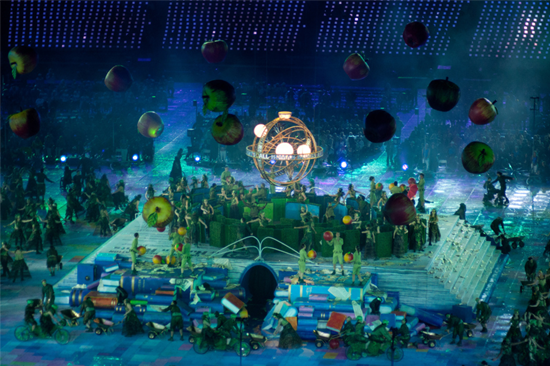* You are viewing Posts Tagged ‘Isaac Newton’

Core team member Anna Marie Roos (our energetic Martin Lister Research Fellow) was in action on BBC Radio 4 this morning dissecting last night’s magnificent science-themed opening ceremony to the Paralympic Games. The ceremony – called ‘Enlightenment’ – dramatized some key episodes in the intellectual development of Britain and Europe from 1550 to 1720, including a montage of giant rolling and floating apples inspired by Isaac Newton’s famous encounter with the fruit in his Lincolnshire garden. In the interview on the Today programme, Anna Marie – who has published on Newton’s reflecting telescope and Lister’s role in developing it – reflects on the significance of the apple incident for Newton’s theory of universal gravitation and unpacks some of the ceremony’s other, more obscure scientific references. The interview is available on the iPlayer (the segment starts at 2:19), while there’s also an interview with Anna Marie on the University’s arts blog.
 It’s an exciting time for friends and colleagues at Dublin’s Edward Worth Library – a collection of 4,500 books, left to Dr Steevens’ Hospital by Edward Worth (1678-1733), an early eighteenth-century Dublin physician – who have contacted us with two reminders:
It’s an exciting time for friends and colleagues at Dublin’s Edward Worth Library – a collection of 4,500 books, left to Dr Steevens’ Hospital by Edward Worth (1678-1733), an early eighteenth-century Dublin physician – who have contacted us with two reminders:
A conference on The Reception of Newton will be held at the Library on 12–13 July 2012. In recent years, considerable attention has been devoted to the elucidation of the precise nature and scope of Newton’s influence on eighteenth-century science in particular, and on Enlightenment culture more generally. The Library is uniquely positioned to contribute to this ongoing reassessment, as its holdings bear unique witness to the spread of Newtonianism in Ireland. Worth’s collection reminds us of the range and depth of Newton’s intellectual impact on Europe and the crucial role played by second generation Newtonians in clarifying, classifying and re-presenting his ideas. The deadline for 300 word abstracts is 1 March 2012; for further details, see the conference website.
The Library is also offering a single one-month fellowship to be held in 2012, to encourage research relevant to its holdings. The collection is particularly strong in three areas: early modern medicine, early modern history of science, and, given that Worth was a connoisseur book collector interested in fine bindings and rare printing, the history of the book. Research does not, however, have to be restricted to these three key areas. Further information about the collection and its catalogues may be found on the library website. The closing date for applications is 30 March 2012. For further details and application procedures please contact: Dr Elizabethanne Boran, Librarian, The Edward Worth Library, Dr Steevens’ Hospital, Dublin 8, Ireland (elizabethanne.boran[at]hse.ie).
 Dr Anna Marie Roos, our industrious Martin Lister Research Fellow, has contributed her expertise to Chemistry: A Volatile History, a three-part series of hour-long documentaries to be broadcast on BBC Four from the end of this week. As well as describing Lister’s various contributions to the discipline, Anna Marie provides insights into Boyle and The Skeptical Chymist, and Newton and alchemy, and assisted producers in their preparation for the programme (including confirming that Boyle did not in fact invent the phosphorous match). The first episode will be broadcast on Thursday 21 January at 9pm.
Dr Anna Marie Roos, our industrious Martin Lister Research Fellow, has contributed her expertise to Chemistry: A Volatile History, a three-part series of hour-long documentaries to be broadcast on BBC Four from the end of this week. As well as describing Lister’s various contributions to the discipline, Anna Marie provides insights into Boyle and The Skeptical Chymist, and Newton and alchemy, and assisted producers in their preparation for the programme (including confirming that Boyle did not in fact invent the phosphorous match). The first episode will be broadcast on Thursday 21 January at 9pm.
 Dr Anna Marie Roos, our Martin Lister Research Fellow, has just published an article on the seventeenth-century physician in Notes & Records of the Royal Society entitled ‘A Speculum of Chymical Practice: Isaac Newton, Martin Lister (1639–1712), and the Making of Telescopic Mirrors’. According to the abstract, ‘In 1674 … Martin Lister published a new method of making glass of antimony for telescopic mirrors, using Derbyshire cawk or barite as a flux. New manuscript evidence reveals that Sir Isaac Newton requested samples of the cawk and antimony from Lister through an intermediary named Nathaniel Johnston. An analysis of Lister’s paper and Johnston’s correspondence and its context reveals insights not only about Newton’s work with telescopic specula but also about his alchemical investigations. Analysing these sources also contributes to our understanding of the nature of correspondence networks in the early scientific revolution in England’. Subscribed users can access the full text of the article here.
Dr Anna Marie Roos, our Martin Lister Research Fellow, has just published an article on the seventeenth-century physician in Notes & Records of the Royal Society entitled ‘A Speculum of Chymical Practice: Isaac Newton, Martin Lister (1639–1712), and the Making of Telescopic Mirrors’. According to the abstract, ‘In 1674 … Martin Lister published a new method of making glass of antimony for telescopic mirrors, using Derbyshire cawk or barite as a flux. New manuscript evidence reveals that Sir Isaac Newton requested samples of the cawk and antimony from Lister through an intermediary named Nathaniel Johnston. An analysis of Lister’s paper and Johnston’s correspondence and its context reveals insights not only about Newton’s work with telescopic specula but also about his alchemical investigations. Analysing these sources also contributes to our understanding of the nature of correspondence networks in the early scientific revolution in England’. Subscribed users can access the full text of the article here.


 It’s an exciting time for
It’s an exciting time for 


 Join
Join 